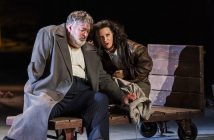Wagner’s operas can feel a bit like watching a test match for the first time. They’re so long you get meal breaks, there is a lot of odd terminology and ritual and, by the end, it’s sometimes hard to tell who’s won, or whether anyone actually has won.
So, it was with slight trepidation I took my seat on a warm evening at the Royal Opera House for Tannhäuser, feeling rather tired and wondering if I should have opted to review something shorter. But, like the longer form of cricket, when you get the hang of it and, when it’s good, a Wagner opera gives you an experience unlike anything else. Thankfully, this production of Tannhäuser is good; very good.

Venusberg dancers
Let’s start with the subject matter. Tannhäuser, in basic terms, is a classic Saturday-night-Sunday-morning tale of a man torn between pleasure and virtue. The two teams are represented here by Venus, goddess of love, sex and desire, and Elizabeth, batting for the virtuous and chaste. It’s lust versus love, whore vs Madonna – you know the score.
But, as is always the case with Wagner, it runs much deeper than that. You could easily read this as a tale of addiction and rehab, or an exploration of the nature of pleasure in its different forms or even, given that Tannhäuser is a celebrated singer, a study of the devastating effects fame can have. Directors could – and do – have a field day with this one. Thankfully, while Tim Albery’s direction doesn’t always illuminate, it rarely gets in the way, leaving the action free to flow.

Venusberg dancers with Peter Seiffert as Tannhäser
The staging centres on a huge replica of the Royal Opera House’s proscenium arch, which dominates the set and crumbles over time. I’m sure it was meant to tell me something, but I didn’t know what, although it looked fantastic. The same goes for the opening ballet. There was no doubt a meaningful message in there, but what I was left with was, ‘wow, jumping over a massive table for fifteen minutes must be hard work, I bet they’re knackered!’
Where this production succeeds, and it really does succeed, is in musical terms. Tannhäuser isn’t necessarily Wagner’s most compelling opera dramatically but it’s one of the best paced, something which is definitely aided by Hartmut Haenchen’s conducting, who maintains it without feeling rushed at any point. There’s some fine singing here too but it’s definitely an overall team effort, and what an effort it is.

Peter Seiffert as Tannhäuser,
Sophie Koch as Venus
The Royal Opera orchestra are on fine form and the chorus also deserve a special mention. I doubt by the end of the opera there’s a single atom of air left in the building that hasn’t passed through the lungs of at least one chorus member. The air they shift is incredible – I can’t imagine you’ll hear better choral singing in an opera this year, or next, or…ever. Glorious stuff.
Peter Seiffert, in the title role, puts in a monumental innings. His sheer commitment and stamina carry him through, even though his voice isn’t what it once was and there was some noticeable raggedness towards the end of the third act. If you want to hear what he sounds like at his best in this role check out Daniel Barenboim’s 2002 recoding of Tannhäuser for Teldec – quite possibly one of the most glorious sounding operatic recordings out there.

Peter Seiffert as Tannhäuser;
Sophie Koch as Venus
Emma Bell is a wonderful Elisabeth and the rest of the cast is also excellent. There is, however, one stand out performance. Christian Gerhaher’s Wolfram is a thing of beauty and depth. I’d come and see this again purely to hear him. He really is that good.
So, in the end, a pleasure rather than a test. Overall an excellent Tannhäuser. If you can make four and a half hours in the theatre, including two intervals, fly by then you’re doing something right. A definite winner.
Tannhäuser at the Royal Opera House, Covent Garden until 15 May 2016. Images © ROH Photographer Clive Barda. For more information and tickets please visit the website.




